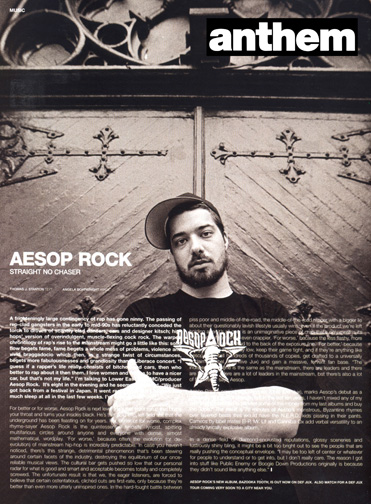
STRAIGHT NO CHASER
A frighteningly large contingency of rap has gone ninny. The passing of rep-clad gangsters in the early to mid-90s has reluctantly conceded the torch to droves of scantily clad dancers, cars and designer kitsch; hip-hop’s version of overindulgent, muscle-flexing cock rock. The warped chronology of rap’s rise to the mainstream might go a little like this: solid flow begets fame, fame begets a whole mess of problems, violence and vivid braggadocio which then, in a strange twist of circumstances, begets more fabulousness and grandiosity than a Liberace concert. “I guess if a rapper’s life really consists of bitches and cars, then who better to rap about it then them. I love women and I’d like to have a nicer car, but that’s not my life.” I’m talking to Lower East Side MC/producer Aesop Rock. It’s eight in the evening and he seems exhausted. “We just got back from a festival in Japan. It went really well, but I haven’t had much sleep in the last few weeks. I’m tired as hell!”
For better or worse, Aesop Rock is next level. He’s that stout syrup that burns your throat and turns your insides black. He’s that scientific, left-field shit that the underground has been feasting on for years. For better or worse, complex rhyme-sayer Aesop Rock is the quintessential lyricist’s lyricist, spitting multifarious circles around anyone and everyone with dense, almost mathematical, wordplay. ‘For worse,’ because often the evolution (or de-evolution) of mainstream hip-hop is incredibly predictable. In case you haven’t noticed, there’s this strange, detrimental phenomenon that’s been stewing around certain facets of the industry, destroying the equilibrium of our once-reliable musical views. The cultural bar gets pushed so low that our personal radar for what is good and smart and acceptable becomes totally and completely screwed. The unfortunate result is that we, the eager listeners, are forced to believe that certain ostentatious, clichéd cuts are first-rate, only because they’re better than even more utterly uninspired ones. In the hard-fought battle between piss poor and middle-of-the-road, the middle-of-the-road rapper with a bigger lie about their questionably lavish lifestyle usually wins, even if the product we’re left holding after it’s all over is an unimaginative piece of crap that’s only merit is its outshining of something even crappier. ‘For worse,’ because the less flashy, more dynamic MCs get pushed to the back of the exposure line. ‘For better,’ because the good ones usually lay low, keep their game tight, and if they’re anything like Aesop, they sell hundreds of thousands of copies, get drafted to a universally acclaimed label (Definitive Jux) and gain a massive, fervent fan base. “The independent scene is the same as the mainstream, there are leaders and there are followers. There are a lot of leaders in the mainstream, but there’s also a lot of followers,” says Aesop.
Aesop Rock’s new album, Bazooka Tooth (Def Jux), marks Aesop’s debut as a producer. “It’s sort of strange, but in the last ten years, I haven’t mixed any of my own beats. I decided to reinvest some of the money from my last albums and buy Pro Tools.” The result is 70 minutes of Aesop’s monstrous, Byzantine rhymes over layered beats that would have the N.E.R.D. kids pissing in their pants. Cameos by label mates El-P, Mr. Lif and Cannibal Ox add verbal versatility to an already lyrically explosive album.
In a dense field of diamond-encrusted reputations, glossy sceneries and lustrously shiny bling, it might be a bit too bright out to see the people that are really pushing the conceptual envelope. “I may be too left of center or whatever for people to understand or to get into, but I don’t really care. The reason why I got into stuff like Public Enemy or Boogie Down Productions originally is because they didn’t sound like anything else.”
THOMAS J. STANTON